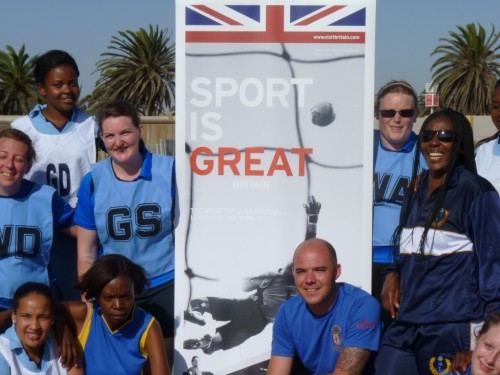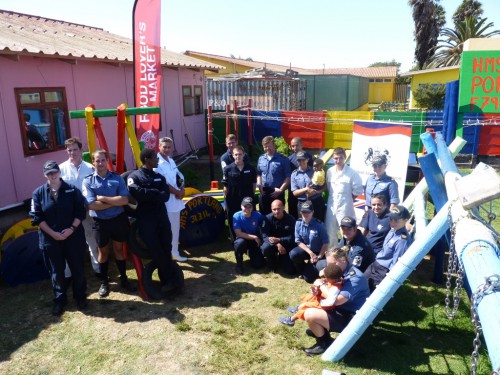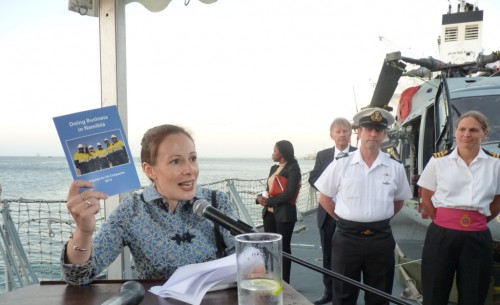2nd April 2014 Windhoek, Namibia
Royal Naval backdrop helps showcase British security and prosperity excellence in Namibia
This week’s 3-day visit of HMS Portland – one of the Royal Navy’s Type 23 Anti-Submarine Warfare Frigates – to the port of Walvis Bay provided a great opportunity to showcase British military, security and prosperity excellence in Namibia as well as the UK’s diversity accomplishments.
As the UK’s first female British High Commissioner to the Republic of Namibia, I was particularly proud to welcome the ship’s captain, Commander Sarah West – the first female captain of a British naval warship and an outstanding example of British leadership excellence. Commander West brought with her a crew of nearly 200 officers and ratings, including 30 women, a good number of which took part in a netball match with their Namibian naval counterparts (sadly we didn’t win: the Namibian Navy won 40:13).
The crew also came ashore to take part in a terrific community outreach project to help build and paint a new playground and jungle gym for Walvis Bay Kids Haven, a refuge for orphans and vulnerable children that was in desperate need of play facilities and brightening up.
A special thanks to donors who assisted in this project: Fruit N Veg City Walvisbay and Kansai Plascon.
A formal business reception on the decks of the warship on the evening of 31 March also provided the opportunity to launch the High Commission’s latest edition of its popular Doing Business in Namibia guide, which is a useful tool to help deliver UK trade and investment targets. It contains a helpful digest of key country background information to explain the investment climate in Namibia as well as practical information to help open the eyes of British companies to the opportunities and challenges of doing business here.
I used the event to update the strong gathering of business officials, security leaders and members of the British community on our latest trade figures, which sadly suffered quite a knock from De Beer’s decision to move its diamond sorting and trading activities from London to Gaborone. To help mitigate this, I encouraged everyone to buy a lot more Land Rovers and British machinery to make up for the shortfall.
UK-Namibia bilateral trade in goods stood at £133 million in 2013, with imports of Namibian goods to the UK valued at £77 million and exports at £55 million. Namibia clearly enjoys a positive balance of trade with the UK, largely exporting minerals, beef, grapes, beer and charcoal to the UK and importing mainly machinery and vehicles from the UK.
The visit and the connected activities helped us to build closer cooperation and understanding between our two great countries. The UK and Namibia have much in common, including shared democratic values, vibrant trade, cultural and educational links, and bonds of friendship and Commonwealth fraternity. This week’s ship’s visit signifies another chapter in our strong record of partnership to achieve a common goal of increased trade volumes and improved security in this region and throughout the world.


